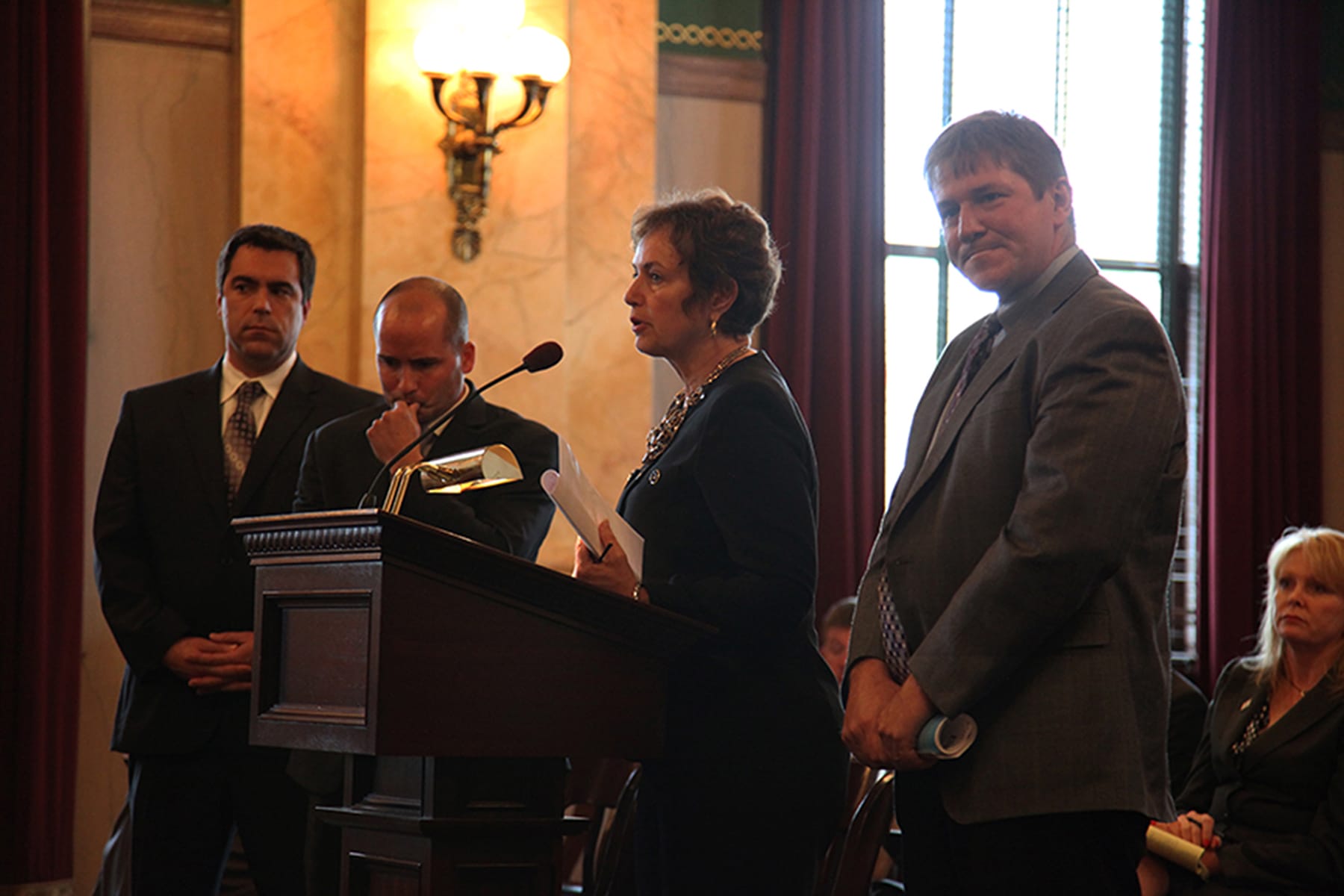
From left: Greg Harris, Robert Kilo, Judy Hennessey and Terry Ryan
A coalition that included high performing charter schools from Cleveland, Columbus and Dayton testified in front of the Senate Finance Committee’s Education Subcommittee on May 7th. Following introductions from Fordham’s Terry Ryan, Dayton Early College Academy’s Superintendent Judy Hennessey began to speak in front of the Subcommittee only to be interrupted by Committee Chair Senator Randy Gardner, “Senator [Peggy] Lehner has just commented you lead one of the best schools in the country.”
Jokingly Judy Hennessey nodded and said, “Now we are striving for world class.”
The coalition of high performing charter schools included school leaders and policy advocates from KIPP Central Ohio, United Students Network, Breakthrough Schools, Dayton Early College Academy, and Students First Ohio who gathered to urge Senators to enact policies that would help facilitate the growth of high performing charter schools in the state. Among the policies discussed, the coalition asked the subcommittee to consider the reinstatement of funding for the Straight-A Fund (from $150 million to $300 million), increasing the per pupil facilities funding to charter schools (from a proposed $100 to $300 a student), and strengthening accountability for the state’s lowest performing charters.
Introduced by Governor Kasich at the outset of the budget cycle in February, the Straight-A Fund would support the growth and replication of innovations in the school system. The coalition wholly supported the implementation of the fund. “We applaud the governor and his team for including the Straight-A Fund as a significant piece of the overall budget,” said Robert Kilo the director of advocacy and major gifts for Breakthrough Schools. The Straight-A Fund, however, was decreased by half as it passed through the House. Kilo continued: “We would like to see the original appropriation for the Straight-A Fund restored to $300 million. This would help schools like ours and other successful and innovative schools to compete and make sure the Governor’s goal of spreading “Achievement Everywhere” is accomplished in an accelerated manner.”
As the budget bill arrives at the Senate, charter schools are looking to gain $100 per pupil to offset facility expenses – which has been a serious impediment to the growth of strong charters in many parts of Ohio. While this marks the first time charter schools can expect facility funds, the coalition urged the legislators to consider increasing the allotment. “We are challenged to secure the funding necessary to remodel existing structures; building new schools is clearly out of our financial reach,” said Judy Hennessey. Fordham’s Terry Ryan and Ohio’s Directors StudentsFirst Greg Harris both echoed this sentiment but with the condition that addition funding would only be given to charters that have proven track records of academic success.
Members of the coalition asserted that, in order to advance the growth of high performing schools, poor performing charters had to be closed. “We believe in the expansion of schools choice but we also believe in greater accountability,” said Terry Ryan. Currently, charter schools in Ohio are not facing strict enough laws that lead to the timely closure of poor performing schools and some sponsors are not taking the necessary steps to hold their schools accountable.
Senator Nina Turner concurred with the coalition. “It is definitely a touchy subject that we have been dealing with,” she told the group, “but I agree with your assertions.” Terry further discussed the implications of not closing bad charters with the subcommittee stating, “Having bad charters ‘blow up’ harms good charters.”
The subcommittee was poised to listen to the assertions made by the coalition, hoping that they could in part some lessons to duplicate their charter’s academic successes through the state of Ohio. Capturing the sentiment of the discussion, Senator Nina Turner shared, “There exists a plethora of schools options but, regardless, every student should be given the highest quality education.”
She also praised the model of cooperation of quality charters and the school district which exists in her hometown of Cleveland, closing the hearing with the apt observation: “We are better together.”
